
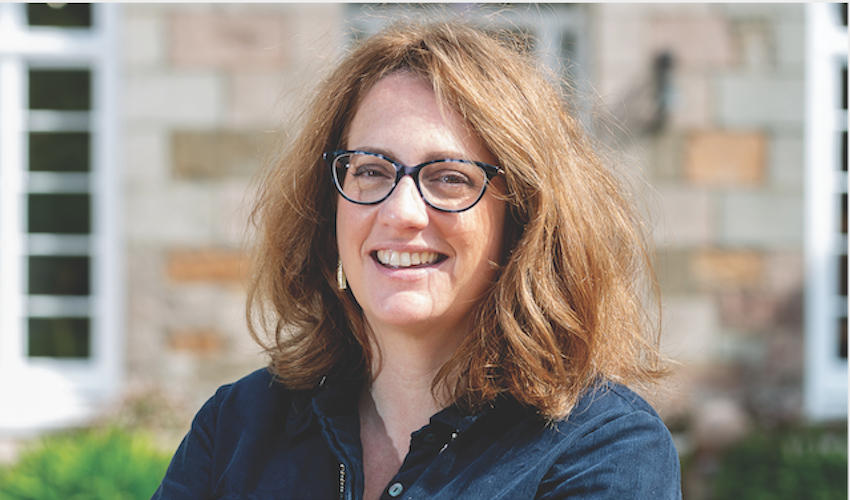
The earthy flavour and "gooey-ness" of a worm she was dared to eat by her brother is one of Durrell's CEO's first ever memories of interacting with nature.
“I can still feel how it felt in my mouth,” Dr Lesley Dickie jokily reminisces.
It might appear an unusual segue in a conversation with the Zoo chief, but, she argues, it’s such moments of childhood fun that lay the foundations for a lifetime love of nature and a desire to protect it.
Despite the world finding itself in a moment of climate crisis and large-scale deforestation, remembering the “joy” of the natural world is more important than ever.
As Durrell celebrates its 60th anniversary with a colourful public sculpture trail of 40 life-size gorillas, Express sat down with Dr Dickie to discuss her past experiences, and the future she sees for Durrell…
Video: Milo Parker, who plays a young Gerald Durrell in ITV series 'The Durrells', picks his favourite gorilla sculpture.
Conservationists are “much more optimistic than the general public", according to Dr Dickie - and this is no coincidence.
“In conservation, you either deal with it or you just sit around crying, because it’s so horrific what’s going on to the natural world… For our teams in the field, there’ll be some days where the forest is burning down around them. It’s literal firefighting some days.”
So where exactly does joy, fun and optimism come into it?
“A visit to the zoo should be joyous. It should be fun. What we do is serious. We do really serious stuff, but I always think you should enjoy it.
“I would certainly say when I arrived nearly three years ago now, there seemed like a sense that we’d forgotten this is meant to be fun. It seemed like a sense that we were too serious about the seriousness of what we do. We’ve not forgotten how serious it is, but I just think that it should be fun, it should be joyful and that is what I wanted to put back into Durrell.”
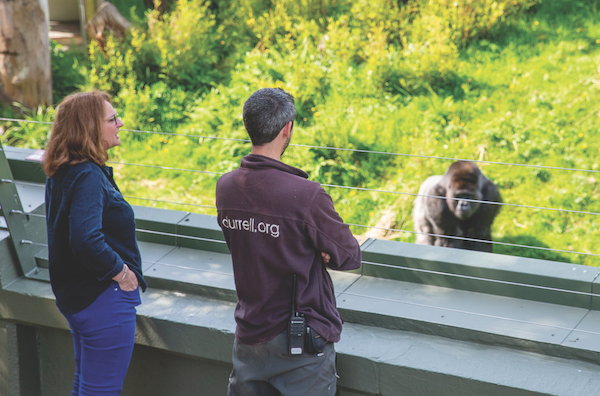
Pictured: Dr Dickie describes herself as her team's "number one cheerleader".
And fun, Durrell’s CEO certainly is.
Describing herself as her team’s “number one cheerleader” and wistfully imagining what her life would be like if she were “an international rockstar” – her zest for life and her work really does have an invigorating effect.
She pauses occasionally to wave at staff and visitors who pass her by in Café Firefly as well as stopping mid-sentence to notice one of the zoo’s Andean bears – Chui, who had made his way up the tree in his enclosure to bask in the sunshine.
“I think part of my management style is I do always want to present a very positive, upbeat, happy perspective for the team because if the person who is leading is not enthusiastic, is not energetic, is not getting out there and seeing the joy of it all – it’s not going to help a team of people who are up against some difficult things.”
Video: A gorilla keeper explains the importance of Durrell's gorilla trail, which combines Dr Dickie's love for art and conservation.
Or perhaps it’s her training in fine art that allows her to bring a fresh perspective to her not so ordinary day job.
Having explored ‘art as advocacy’ during her Foundation degree at the Art Academy in London long after getting her PhD, Dr Dickie muses about the “overlap” between her two passions of art and zoology.
“I think art’s a really powerful thing. I always think everyone has different interests in life and if I as a conservationist want people to care then I need to be able to reach people in whatever way is easiest for them to be reached and for some people that’s art.”
As Chief Executive Officer, Dr Dickie is responsible for devising these overarching strategies to get more people visiting, supporting and talking about the work that Durrell does, but despite her managerial role she talks about the charity with an understanding of everyone’s role in their mission-led aim to protect endangered species.
From the café staff to the keepers, Dr Dickie states: “I would not expect anyone to do anything that I wasn’t prepared to do myself – anything.”
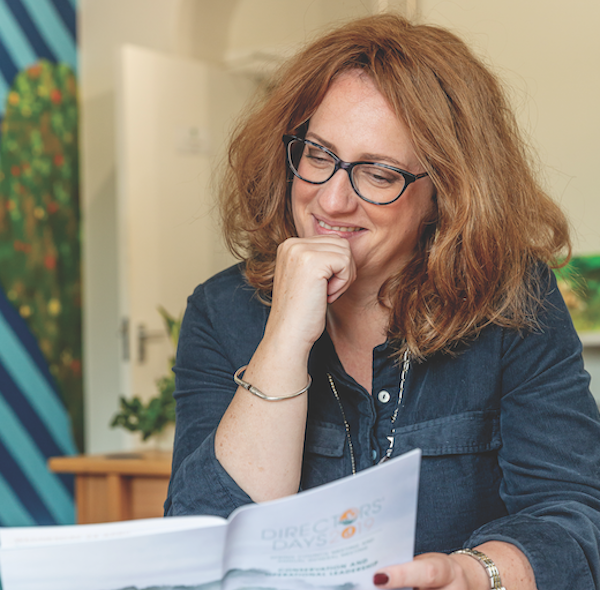
Pictured: Dr Dickie studied Zoology at Glasgow University, followed by a Masters in Biological Anthropology at Cambridge.
Having grown up in Glasgow in the 1970s and the first of her family to go to university, Dr Dickie’s brand of optimism has an edge of both determination and of innovation.
She reminisces about her childhood pets – terrapins, cats, birds, but always wanting a dog - and watching nature documentaries at home with her family as a young girl.
She also recalled her regular trips to the public library as a young person, speaking of escaping the “poverty” of her upbringing by burying her nose in a book and thinking up a “bigger life” for herself.
“I saw being a Zoologist as part of that – to do something that was different and to do something that was meaningful.”
Apart from the formative worm story, the esteemed zoologist tells me that the feeling of a goat trying to chew her trousers at a farm and spending her summer holidays “catching fish” and connecting with the myriad of Glaswegian parks at her fingertips all contributed to her decision to create a career that had nature at its heart.
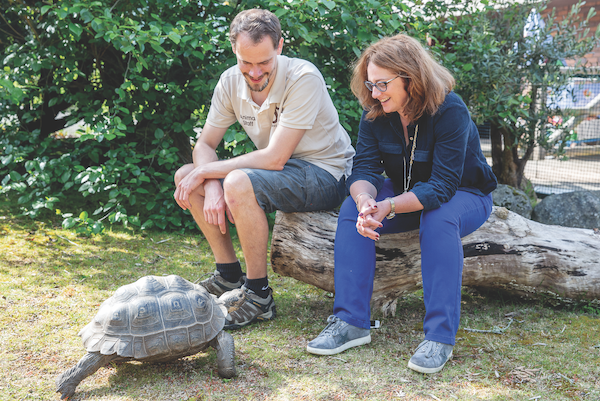
Pictured: Dr Dickie worked her way up from volunteer to CEO.
It was during her Bachelor’s degree in Zoology at Glasgow University and her Masters in Biological Anthropology at Cambridge, Dr Dickie became academically interested in the zoo setting.
Working her way up from volunteer to CEO was no mean feat, but – having worked in and around zoos since her early 20s – she tells me it is what has given her the understanding of both the commercial and conservation aspects that zoos like Durrell need to deliver.
When asked whether striking the balance between the environmental and economic aspects of running a zoo is ever a challenge, Dr Dickie says, coolly: “I don’t have an entirely purist attitude. I do want people to come to the zoo and have fun and of course I want them to spend money, because that means we can do the conservation.
“For me, these things are not mutually exclusive because they’re all part of the whole jigsaw puzzle of getting to the end result, which is saving species.”
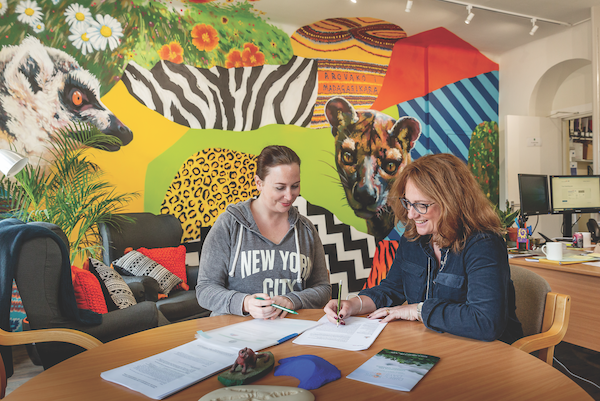
Pictured: Dr Dickie became more involved in the executive side of zoo life after her PhD at Queen Mary University in London.
Her role is certainly one which requires the ability to balance lots of different skills and demands: “You’re not an expert in any one thing as a CEO but you need to be aware of what all your experts are doing, so I might be talking about the audit process with our Head of Finance and where we are in the audit and then the next meeting I might be talking about a nature connection study and the results of it… so each meeting is really, really different.
“It is a very varied day, but I try and go out in the zoo at least once a day and go out and see animals and see what’s happening.”
It was after completing her PhD at Queen Mary University in London that Dr Dickie became more involved in the executive side of zoo life. She was appointed in her first senior role as Director of the European Association of Zoos and Aquaria (EAZA) in Amsterdam at a point in her career where she had never held a budget or had staff.
Of this, she smiled and said: “I’m a great believer in going in at the deep end and you sink or you swim and I think most people swim. I think given the chance – and I always think it’s good to give people the chance – they rise to the occasion. I think that’s the normal human thing.”
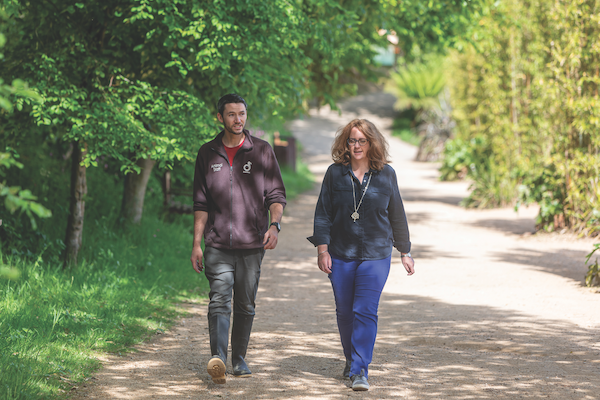
Pictured: “71% of all European Zoo Directors are male,” says Dr Dickie.
As she talks about being rejected twice for this job at EAZA, it’s evident that Dr Dickie is a swimmer not a sinker, even when struggling against a tide of being a young female academic trying to break through to the often male dominated higher echelons of zoo management.
This Dr Dickie crystallises by reeling off a worrying statistic: “71% of all European Zoo Directors are male,” adding plainly, “I am unusual.”
Although at Durrell, Dr Dickie proudly explains that the gender split amongst keepers is exactly equal and across the whole Trust - it’s 51% female and 49% male, rising to 63% female at senior management level - which she explained isn’t always the picture across the world’s zoos.
“Any organisation is a microcosm of society and, although we’ve got lots and lots of young, female staff, who hopefully we can encourage… the world is unequal for women.”
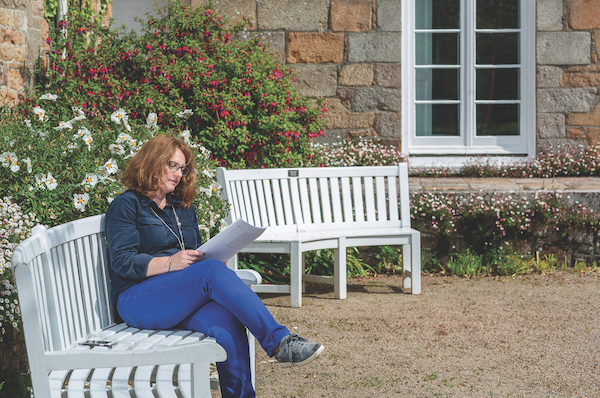
Pictured: "You’re not brave if you’re fearless. You’re brave if you fear something and do it anyway."
However, as a woman who has managed to climb the zoological ladder and the first female CEO of Durrell, Dr Dickie emphasises the importance of role models.
“One of my younger female staff said to me for the first time she can imagine herself as a CEO because the CEO looks like her.”
When asked if she is brave, she laughs and then pauses, saying calmly: “I think bravery is a practiced skill. You’re not brave if you’re fearless. You’re brave if you fear something and do it anyway.”
This article first appeared in Connect. You can read the latest edition here.
Pictures: Dr Dickie in her natural habitat, Jersey Zoo, caught on camera by Gary Grimshaw.
Comments
Comments on this story express the views of the commentator only, not Bailiwick Publishing. We are unable to guarantee the accuracy of any of those comments.